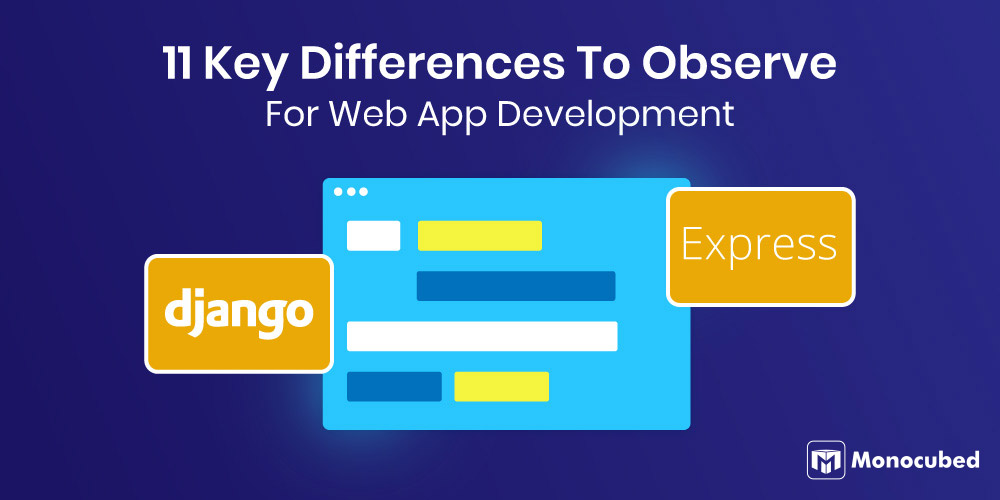Today, web applications have turned out to be a vital part of each business. The companies want eccentric web frameworks to build versatile web and mobile apps.
Two very popular web application frameworks available today are Django and Express. Both provide exceptional features that simplify the development process and ensure a cost-effective, high-performance web solution.
Which web framework is faster?
Is Express or Django better for eCommerce platforms?
Which framework is good for MVP development?
To answer all these questions and more we bring a detailed comparison of Django and Express.js frameworks.
In this blog, we will have a detailed comparison battle of Express.js vs Django based on different aspects like architecture, programming, performance, and security.
Table of Content
Django Vs Express: The Key Differences
Django is an open-source web framework that observes the Model-View-Template (MVT) architectural design.
This is a Python-based framework and preserved by an American independent association, Django Software Foundation (DSF), an American independent association recognized as a 501(c) (3) non-profit.
Express or Express.js, is a backend web application framework for Node.js. It is open-source and free software released under the MIT license.
An Express.js website can be done easily by the programmers in a few lines of coding within a very limited time frame.
Between Django and Express web frameworks, the former is a standalone and lightweight web server for testing and development, while the latter is permitted to set middlewares to reply to any HTTP request.
Below-mentioned is the vital difference between Express.js and Django:
| Aspects | Django | Express.js |
|---|---|---|
| Framework | This framework is an Python-based framework for proficient developers whose intention is to develop computer apps in a specified time frame. | Express.js is an assertive, moderate, and fast framework of Node.js. You can think of Express as a layer developed on the top of Node.js that aids administer routes and server. |
| Architecture | It supports the MTV model template design. It aids with managing data for interacting and validating | It follows Model-View-Controller (MVC) architecture |
| Efficiency | It is more efficient and delivers fast speed. And hence, it is cost-effective | It is beneficial for developing web apps rapidly on NodeJS |
| Programming | It is programmed in Python | This framework is programmed in Node.js |
| Complexity | Django is more complex than Express.js | Express.js is less complex |
| Scalability | It is less scalable | With Express.js, it can easily scale up your web app |
| Flexibility | It has strict traits, and hence, offers limited flexibility | It is a flexible, minimal API-developing NodeJS tool |
| Language | It was written using Python | It was written using JavaScript |
| Full-stack development | It is used for full-stack development, enabling both fronted and backend code. | It is a JavaScript server-side framework that can be used occasionally for frontend development. |
| Best-suited | It is suited for small-scale apps | It is suited for small-scale projects |
| Companies | Instagram, Mozilla, Bitbucket | It is used by PayPal, IBM, Fox Sports |
Want to Develop an Advanced Web App?
Chatbots? Auto text completion? Enhanced search using images or sound? You can do all these and more with the help of our Django developers.
What is Django Used For?

The Python web framework is intended primarily to confirm high-speed development. The primary objective is to ease the formation of multifaceted database-oriented websites.
Django emphasizes pluggability and reusability of less code, components, quick development, low coupling, and the notion of Don’t Repeat Yourself (DRY principle) due to which it has amassed a huge community.
Python is utilized for files, data models, and settings. Django delivers an elective administrative create, read, update and delete (CRUD) interface that is produced vigorously through contemplation and designed via admin prototypes.
Characteristics of Django Framework
Django is one of the top Python web frameworks that provides rapid web app development. It has a pragmatic and clean design. It is recognized for having a ‘batteries included’ viewpoint, hence it is ready to be utilized.
It is well-used in Machine Learning, Big Data and Artificial Intelligence because of its speed and advanced modules. Here are some of the vital features offered Django:
- Highly loaded:
Django takes care of content management, user authentication, site maps, and RSS feeds effectively.
- Extremely fast:
This framework was planned to aid programmers to take web applications from the initial conception to project completion as rapidly as possible.
- Versatile:
Organizations and companies use Django to develop all kinds of things – from social networks to content management systems to scientific calculating platforms.
- Exceptionally scalable:
It can flexibly and quickly scale to meet the heftiest traffic loads.
- Database integration:
Django allows developers to integrate popular database management systems such as MongoDB and PostgreSQL.
This allows you to develop database-driven applications that will handle huge datasets and also help you analyze the user data with data visualization tools.
- Secure:
Django undertakes security cautiously and aids the community to evade numerous general security mistakes like cross-site scripting, SQL injection, clickjacking, and cross-site request forgery.
The user authentication scheme delivers a safe way to administer user accounts and their passwords.
What is Express.js Used For?

TJ Holowaychuk, the original author, defined Express as a Sinatra-based server, stating that it is moderately minimal with several characteristics obtainable as plugins. It is intended to develop REST API and web applications.
It is the backend technology used in popular development stacks such as MERN, MEVN, or MEAN stack, composed of one of the front-end frameworks (Angular.js or React) and the MongoDB database software.
As Express.js needs only JavaScript, it becomes simpler for programmers to develop applications without much effort. But it has a steep learning curve for beginners due to the numerous new concepts introduced in Node js.
This framework of Node.js describes that most of the coding is written already for the community to employ. You can develop multi-page, hybrid, or single-page web applications utilizing Express.js.
It is extremely lightweight and aids in developing web applications on the backend side in a structured MVC architecture design.
It is imperative to study HTML and JavaScript to be competent to utilize Express.js. It is a portion of a JavaScript-oriented technology named MEAN tech stack which stands for ExpressJS, MongoDB, Node.js, and AngularJS.
It is the back-end measure of MEAN and controls sessions, routing, error handling, and HTTP requests.
Characteristics of Express.js Framework
Express.js is a flexible and minimal Node.js framework that supplies a vigorous set of traits for mobile and web-based apps.
With innumerable HTTP utility approaches and middleware at disposal, making a dynamic API is easy and quick.Numerous popular web frameworks are constructed on this framework.
Below are some of the noteworthy features of Express.js:
- Middleware:
Middleware is a fragment of the platform that has access to the client request, database, and other such middlewares.It is primarily accountable for the organized organization of dissimilar functions of this framework.
- Rapid backend development:
Express.js supplies several commonly utilized traits of Node js in the kind of functions that can be freely employed anywhere in the package. This eradicates the requirement to code for long hours and therefore, saves much development time.
- Templating:
This framework offers templating engines that sanction the web developers to develop vibrant data on the web pages by developing HTML templates on the backend.
- Debugging:
Debugging is critical for efficacious web development. Express.js creates debugging simpler by supplying a debugging device that can identify the precise part of the webpage which has errors or bugs.
- Routing:
Express.js delivers an extremely progressive routing mechanism that aids to preserve the condition of the web page with the assistance of their URLs.
Want to Develop a Cost-efficient Web App?
With Node.js you can get scalable, lightweight, and super fast web apps like Netflix and Uber. Well worth your money. So what are you waiting for?
Django or Express: Which One is Better For You?
Express and Django are both free, open-source technologies.
Express.js makes it simpler to develop server-side applications utilizing Node.js. Express.js developers deliver numerous benefits to web application projects, comprising improved app efficiency and quicker development times. Being a Node js development company in USA, we use Express for web development.
Django is a great alternative if you are considering utilizing plenty of external libraries and a relational database. Django developers can opt for this framework if they need high security and want to build complex high-performing applications. Contact us to get professional Python application development services using Django.
In Django vs Express.js performance comparison, Express is much faster than Django. Django is generally considered a slow framework that can affect your website development phase. But performance issues can be easily negated by experienced developers.
Frequently Asked Questions
Is Django better than Node.js?
From Django vs Node.js, the former is all about the developer’s experience and choice, while the latter is for proficient developers who require to develop practical apps. Django encourages rapid development and can be utilized for developing highly-scalable web apps. You can use this framework if the developers have excellent expertise in Python. Node.js is a popular framework of choice when you require a performative runtime environment. It is also apt for when you want to use JavaScript consistently throughout the web project.
Is Node.js faster than Django?
Both the tools, have outstanding performance and scalability. Nevertheless, Node.js does improve upon the performance and speed issues of the later. Django appears to have the advantage of high scalability and complexity, but the ‘batteries-included’ approach slows it down. So if speed and page loading time is of importance, Node.js is much faster.
What is Express.js and what is it used for?
Express JS is an free, MIT licensed, open-source backend development framework for Node.js. It is utilized for building and designing applications easily and quickly. It supplies a simple routing for the requests made by consumers. This framework offers a middleware that is liable for creating decisions to give accurate replies for various requests.
Conclusion
Django is an advanced Python framework, delivering simple syntax with much reliability, scalability, and flexibility. Whereas, Express offers a thin sheet of essential features required in a website, without complicating the characteristics of Node.js.
From the above Express vs Django comparison, we can analyze that both the technologies have their peculiar characteristics and should be utilized aptly as per your project requirement.
You can contact Monocubed to build robust applications rapidly with the essential functions with either Express or Django.
 By Yuvrajsinh Vaghela
By Yuvrajsinh Vaghela



